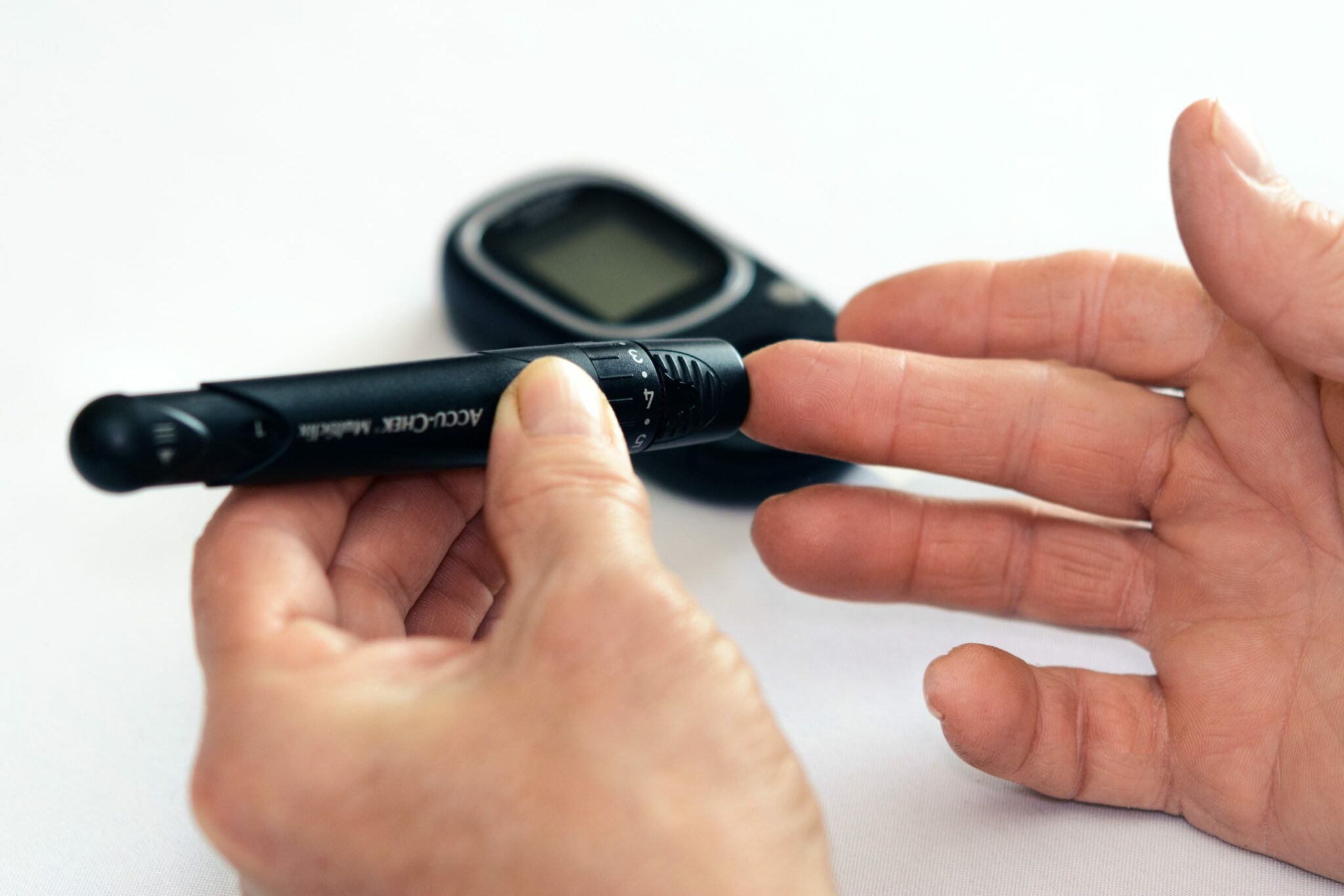Diabetes can affect every part of your body, including your dental health. Find out how and learn 5 preventive measures to safeguard your smile
Diabetes is a widespread condition in the United States, affecting 34.2 million Americans — around 10% of the population.
In 2018, statistics showed that there were at least 1.5 million new cases.
But while many people know that it can adversely affect the kidneys, nerves, eyes, and heart, this condition has a lesser-known impact on the body.
Diabetes can damage your smile in several different ways, and it often does…
But!
It wouldn’t be a Dental Express article if we didn’t give you some dentist-approved tips to preserve your dental health.
So, follow along as we go over what diabetes is, how it can harm your mouth, and the best ways to fight back.
What is Diabetes?
First off, it’s important to note that there are two main types of diabetes: Type I and Type II.
Both involve issues with insulin, an essential hormone produced by the pancreas that helps cells absorb sugar from the bloodstream.
Here’s how it works…
Whenever you eat food, your body breaks most of it down into sugars. Those sugars then enter your bloodstream, which your pancreas sees as a signal to start producing insulin.
The insulin essentially escorts the sugars out of the bloodstream and into the cells that need them, providing energy for your body.
But when you have diabetes, this process is disrupted.
In those who have diabetes, insulin is either not available, or their body can’t make proper use of it, which leaves all that blood sugar hanging around in their bloodstream.
And when high levels of blood sugar sit in the bloodstream for too long, it can lead to serious health issues, which we’ll cover in a moment.
Type I Diabetes
Now that we’ve covered the basics, let’s explore the difference between the two types, starting with Type I.
Type I diabetes is an autoimmune condition where the body prevents itself from producing insulin. To manage their blood sugar levels, Type I diabetics have to inject insulin every day. If not, the consequences can be life-threatening.
Out of the 34.2 million people with diabetes, anywhere from 5-10% of them have Type I. Children, teenagers, and young adults usually develop this condition before adulthood.
Type II Diabetes
Type II diabetes occurs when high blood sugar levels are a constant issue. Trying to keep up, the pancreas creates more and more insulin to balance things out.
Eventually, in response to the cranked-up insulin levels, cells simply don’t respond to it as well anymore. This process is called insulin resistance, which is the precursor to Type II diabetes.
Around 90-95% of people with diabetes struggle with Type II.
There are medications to treat it, but a healthy diet and regular exercise are the best natural cures.
How Does Diabetes Affect My Dental Health?
If you or a loved one has diabetes, you’re no stranger to the health risks that come with it. Heart disease, cardiovascular disease, circulatory issues, kidney disease, and vision loss are just a few.
But when it comes to your dental health, there are several other factors to be aware of.
We borrowed a list of potential symptoms from the American Dental Association, so you know what to look out for. Check them out below:
- You may have less saliva, causing your mouth to feel dry – Because saliva protects your teeth, you’re also at a higher risk of cavities (Dry mouth is also caused by certain medications).
- Gums may become inflamed and bleed often (gingivitis) – When you have diabetes, your body loses some of its ability to fight harmful bacteria.
- You may have problems tasting food.
- You may experience delayed wound healing.
- You may be susceptible to infections inside of your mouth – for example: thrush
- For children with diabetes, teeth may erupt at an age earlier than is typical.
If any of these sound familiar to you, or you’re experiencing one or more of them, see your San Diego dentist right away.
But even if you’re not showing any signs of these issues, make sure your dental care provider knows you have diabetes.
That knowledge can inform their decisions on how to monitor your dental health, which can save you a lot of trouble in the long run.
The more your dentist knows about your health, the better they can care for your smile.
If I Have Diabetes, Am I More Prone to Periodontitis?
Unfortunately, yes.
As the above list suggests, people with diabetes are far more vulnerable to infections, including oral health conditions like thrush, gum disease, and gum disease’s big brother: periodontitis.
Due to the high sugar content in the bloodstream, diabetes causes blood vessels to thicken, reducing the flow of blood to the gums, teeth, and jawbone.
As a result, the body can’t supply oxygen and nutrients or remove waste from those areas as effectively.
Without the vital resources they need, the oral tissues begin to weaken, leaving them more open to decay.
But the relationship between diabetes and periodontitis doesn’t end there. In fact, it may even create a vicious cycle…
According to the American Academy of Periodontology:
“Research has suggested that the relationship between diabetes and periodontal disease goes both ways – periodontal disease may make it more difficult for people who have diabetes to control their blood sugar.
Severe periodontal disease can increase blood sugar, contributing to increased periods of time when the body functions with a high blood sugar. This puts people with diabetes at increased risk for diabetic complications.”
This increased risk is why it’s so crucial to talk with your dental provider as soon as possible.
Diabetes is an unforgiving condition that can affect the entire body. But if you and your San Diego dentist work together, you can give your smile the care and attention it needs to stay healthy.
How to Protect Your Smile
Now that we know how diabetes can impact your dental health, let’s open the preventive toolbox and see what you can do to keep your smile safe.
In their profound dental wisdom, the ADA provides us with some helpful guidelines to ward off the adverse effects of this harmful condition.
Tip #1 – Manage Your Blood Sugar Levels
Since diabetes directly affects blood sugar levels, the first and most important step is doing your best to manage them.
This includes following your doctor’s recommendations, taking any medications as directed, and, if necessary, making lifestyle changes to promote blood sugar control (i.e., healthy nutrition, exercise, etc.).
The more balanced your blood glucose levels are, the less likely you are to suffer from dental health symptoms like thrush, dry mouth, and gum disease.
Tip #2 – Stay Away From Tobacco
Plain and simple.
Tobacco use is the biggest risk factor for oral cancer, and it can lead to tooth decay and gum disease as well.
Combined with the increased risk of infection that comes with diabetes, the potential consequences are no joke.
So, whatever you do, steer clear of tobacco.
Tip #3 – If You Have Dentures, Clean Them Every Day
Whether you have a removable partial bridge, partial denture, or a full set, be meticulous about cleaning them daily.
The cleaner your smile, the healthier your mouth will be.
Tip #4 – Be Consistent With Your At-Home Oral Hygiene
Brush two times a day and floss once to clear out any food and harmful oral bacteria. Your dental health depends on it!
Tip #5 – Visit Your San Diego Dentist for Routine Cleanings & Checkups
Especially when diabetes is a part of the equation, seeing your San Diego dentist is one of the best things you can do for your smile.
If you or a loved one is struggling with this condition, Dental Express is here for you.
We work together with each of our patients to develop a plan that takes their wants, needs, and budget into account, and every one of our decisions reflects that.
If you have any questions about dental health and diabetes, or you’d like to schedule your first appointment, contact us at the location nearest to you.
Let’s build your ideal smile together!
Keep Reading
7 Times You’ll Need Emergency Dental Care
How to Easily Identify & Prevent Oral Cancer

